
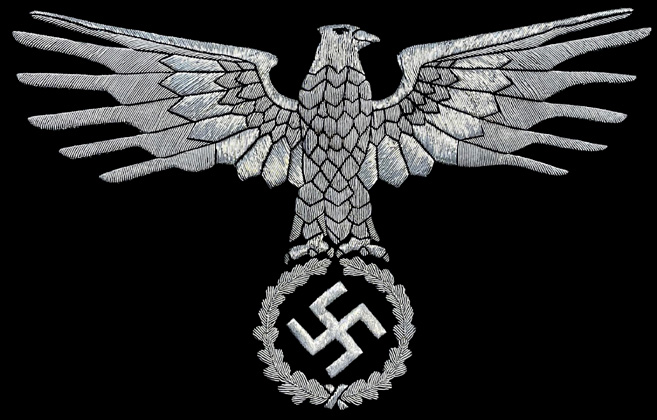
[Above: A beautiful eagle taken from an SS funerary pillow. Click to enlarge.]
Interview with Knight's Cross winner SS-Obersturmführer Erwin Bachmann, who served in 'Germania', 'Wiking' and lastly 10. SS-Panzer 'Frundsberg', where he was given his own command and served as Battalion Adjutant. Bovenden (Lower Saxony), Germany, 1989.
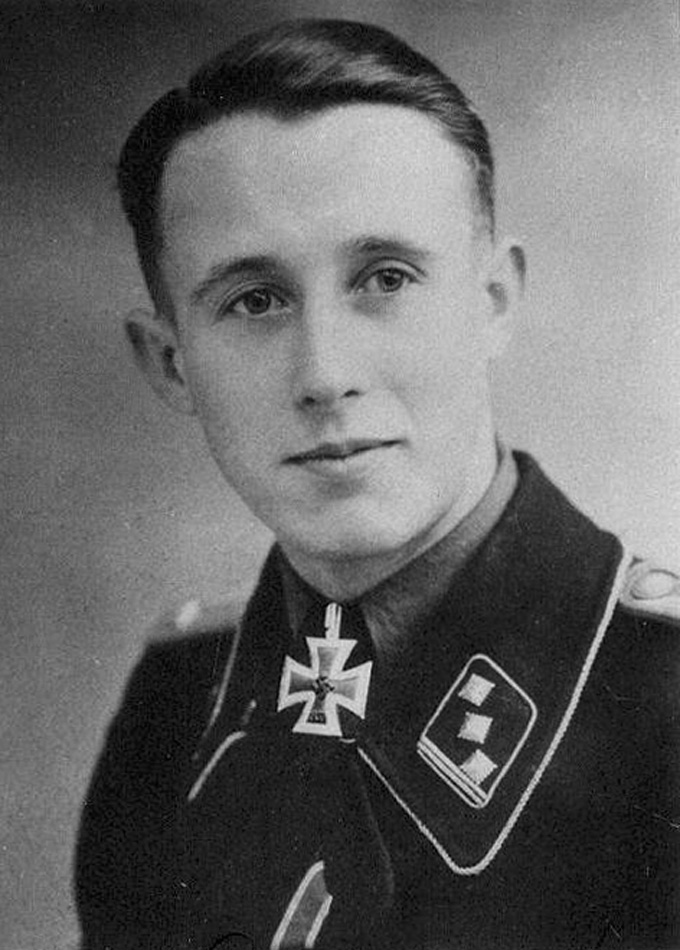
Thanks for meeting with me, I would like to start by asking what brought you
to join the SS?
Erwin: You could say the time I lived in. I studied to be in business, I studied
long and hard to learn about the ways of big business and to help run an
office. I had no real skill or desire to be a soldier. By 1939 it was becoming
clear to most Germans that the former enemies of the first war were plotting
a second, even with the numerous peace treaties Germany signed, they still
sought war to stop our reunification.
To elaborate on this, France took large areas of Germany, Poland
was created out of a larger area of Germany, Czechoslovakia was created out
of German lands, and a few other nations partook in taking land from a
weakened Germany. Adolf Hitler came to power mainly on the promise of
returning these lands and people back to their rightful nation. In this he met
much resistance, as it showed the errors of the Allies, who would never admit
they were wrong in singling Germany out as the sole culprit in starting the
first war.
Hitler was very successful in bringing most of the land back, but we
could see Poland was different; according to the British press, Hitler had to
be stopped, and they threw all sorts of lies at us. One that stands out was we
wanted to take over the world. This is still popular today. Nothing is as far
from the truth, we only wanted a return of all Germans who had been torn
away. With regards to Poland, for the first time, masses of Germans fled that
nation, as they were targeted for violence, some even killed.
I could tell this was not going to end well. We had a family that was
settled into Göttingen, and who told of very brutal treatment at the hands of
roving Polish bands who smashed their windows and assaulted the man and
wife in front of their children. We were hearing of numerous instances of border
crossings, fights, and thefts. Hitler offered concession after concession but
the British egged-on Poland to refuse all offers. This only served to inflame
the Poles with more bravado and violence against Germans.
Talk of war was starting by August, and a comrade suggested I
volunteer instead of being drafted. I had always admired the SS men with
their elite black uniforms and a strong sense of order and precision. In late
August I visited a recruitment office for the SS-Standarte Germania and was impressed. I signed the papers and was selected to go through the acceptance
process.
What was the acceptance process like?
Erwin: At that time the SS was very elite, only the most physically fit could
join. You also had to prove you were of unmixed blood, meaning you were
of the Germanic tribes who made up the peoples of northern Europe. This was
Himmler's idea and based on the old type of racial science that was popular
in the world at that time. An SS candidate had to go through many tests to
look for genetic defects and any health issues.
Once passed through I was sent to the SS-VT [SS-Verfügungstruppe (Combat Support Force), formed in 1934 as combat troops for the NSDAP] and then on to the
Germania Regiment. I was in training when war broke out on the 1st of
September. We assembled in our barracks and our commander said we were
in a state of war, therefore sentries were to be armed and had to patrol. For
the first time it dawned on me that war meant shooting, but I was told by the
recruiter that I could serve in administration. I brought this up to my training
NCO, and he rebuffed me, saying Germany needed warriors, not pencil
sharpeners. Therefore, I was trained in the infantry, and in particular on the
MG34.
You were in the French campaign, what do you remember about this?
Erwin: I was, it was uneventful for me however. Many men had been in
Poland and were combat veterans, so they got all the tough jobs and were in
the front units. The new recruits were sheltered, if you will; I call it 'on the
job training'. We marched a lot and got to see the aftermath of the battles.
Germania had very few motor vehicles, so we marched many kilometers. My
main job during this time was to learn the ropes as a machine gunner, but I
ended up keeping track of the weapons and prisoners we captured more than
anything else. It was my first taste of administration duties.
I did such a good job with this and with assisting comrades with lost
equipment that my leader told me I had leadership potential. I paid attention
to how the adjutants worked and how the command structure was set up,
with the goal of being a leader someday. Our march into France was fast
moving, and we achieved victory over a superior enemy in a very short time.
It was a proud moment for us to have achieved in a few weeks what our
fathers could not in 4 years.
Everywhere we went, we saw demoralized French and countless
prisoners. One of the first things we did once the fighting stopped was to care
for the refugees. The roads were so clogged with them they often made movement hard. They had to be helped off the roads many times, with carts
being stuck, and breaking. Many of us carried chocolate that the children
liked, and we provided food if the Red Cross was not close. We spent the
later part of the campaign helping the French organize and rebuild what was
lost. You will not hear about this in the history books you read.
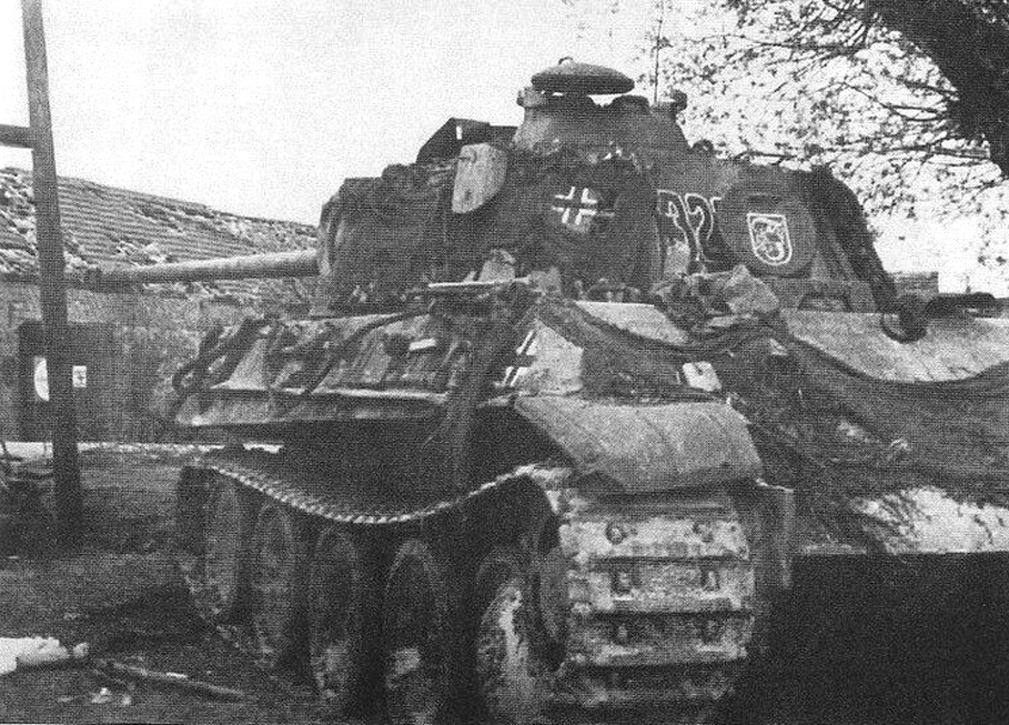
[Above: A Frundsberg Panther tank. Note the division's 'F' symbol painted on the tank.]
The British often made accusations that the Germans shot and strafed French
civilians, did you see any of this?
Erwin: I only saw this once, and it was a German column that had been
attacked by Allied planes, killing several civilians who had been mixed in.
You have to understand these are not war crimes, I am sure the Allied pilots
did not know civilians were on the road too. Most of the time, in any army,
the civilians are kept away, or told to straggle at their own risk. I am sure we
attacked Allied columns with the same results too. There is never the intention
of directly hurting civilians, but war can be cruel, and this is something that
all sides attempted to avoid, Russia being the exception in many cases.
War propaganda is dangerous in this area, as it attempts to portray
the other side as reckless and inhuman, encouraging people to seek justice
for a wrong. We Germans never deliberately attacked civilians; anyone doing
so would be severely punished. However, the Allies took these accusations
to heart and exacted revenge for things that never happened, especially at the
war's end.
What do you remember about Russia and the war in the east?
Erwin: Barbarossa was hard, it was on such an enormous front that there
would be several kilometers distance between units. My unit, which was still
Germania, but now part of the Wiking Division, attacked into Galicia and met
very stiff resistance. We attacked a very strong and well-prepared enemy,
who held vast stockpiles of supplies, ready to strike the west. We came upon
many of these dumps, and took what we could, but turned most of the
foodstuff over to the civilians.
You have heard this was a war of extermination, the SS killing all
within our path. This is war propaganda, and false. I have spoken to many
comrades of the Eastern Front, and I have never heard stories of Russians
being mistreated. We went out of our way to treat them well, and many aided
us as best they could. It is true that in many towns we were hailed as liberators
from the ungodly Bolsheviks. Once we stopped in a small village and were
treated to a nice chicken and dumplings meal, our goulash cannon [or 'gulaschkanone', a battle field kitchen, its furnace tube is reminiscent of a cannon barrel] helped also
with German sausages, which the people found quite good.
The early months of the war were good, we advanced quickly, only
getting into a few battles with determined Soviets, most of the time they
surrendered without much fight. I remember we started to see incidences of
Soviet war crimes very early on and did our best to document them, but we
had to have police to help and that was not always possible. Something you
should know is that German army units, even SS, could not execute anyone
without police presence. Any criminals had to be turned over to police units
for investigation to determine their guilt or innocence.
Some units, in very limited numbers, did execute partisans on the
spot, but this was against regulations and perhaps there were special
circumstances that warranted this. I say this because I want it known we could
not just grab someone and execute them, military law had to be adhered to
without question. The Russian soldier was mostly uneducated and lacked any
discipline. We saw many who were shot by their own political officers for
cowardice.
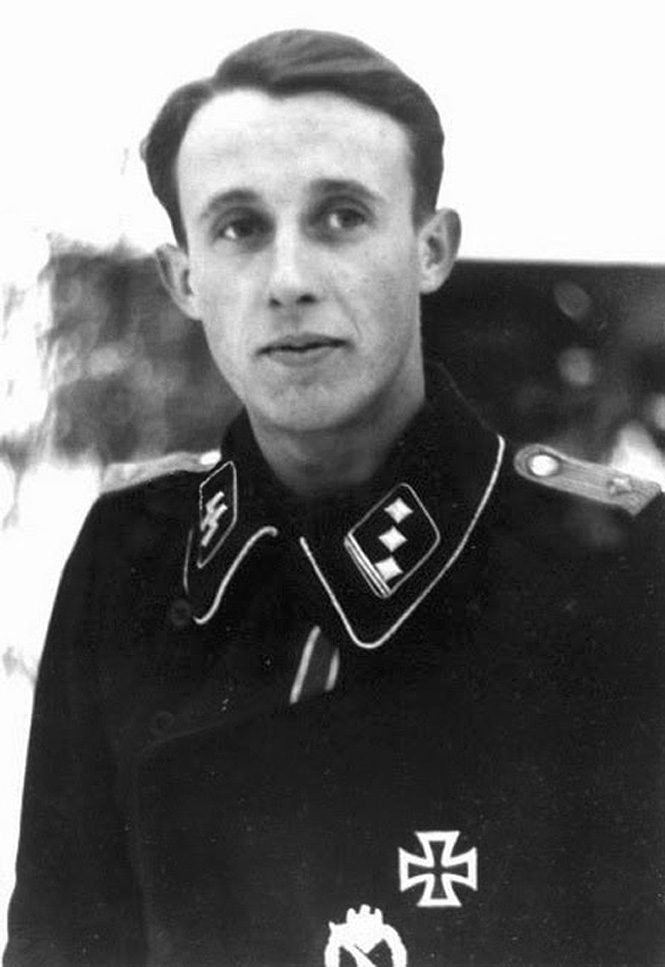
[Above: Erwin Bachmann before earning his Knight's Cross.]
You won the Knight's Cross, can you tell me what happened for this to be
awarded?
Erwin: I am a good example of how fate sometimes thrusts you into a
situation you did not expect. To begin, this happened on the German/French
border in 1945. I was now a part of the Frundsberg Panzer Division and was
in a Sturmgeschütz [assault gun] battalion. I had also by now been promoted to a command
position in a frontline combat unit. I still considered myself a desk officer,
and worked doing many administrative duties for my commander, while
doing a good job, leading men in combat at the same time.
Since we were a combat unit, I became familiar with anti-tank guns,
and was thrust into fighting several times, I hated it, but duty is duty. The
Americans were halted along the border after the Ardennes failure, and we
were very understrength, but still had the will to fight. My unit worked very
close with our Panzers so I was very familiar with Panthers and the Panzer
IV long barrel in addition to the Stugs [Sturmgeschütz, an assault gun].
I was in a briefing when news came that Allied armor was in the
next town, which I was very familiar with. Two Panthers outside had just
been refueled and armed. I ordered them to follow me, I got on a motorcycle
and headed toward the town. I was stopped by soldiers who advised that the Amis [slang for Americans]
had many tanks close by. I stopped the Panthers and arranged them for a
quick attack if the situation presented itself.
I went away to scout, and as soon as I came into the town I saw a
tank, just as it fired at me. I ran back to the bike and grabbed a Panzerfaust,
which was very effective. I hit a Sherman and the Panther hit another. This stunned the Amis, and as the other Panther came into the town, I saw a white
flag. The Amis asked to surrender, which stunned me, they outnumbered us
by a large margin. I accepted, and then they presented German soldiers whom
they captured. We gave them weapons and ordered all the intact tanks
brought to our lines. I radioed that I had a surprise for the regiment.
My comrades were shocked at this exploit, and so was I. The Amis
were well-treated, and I was thanked by their commander for the fair
treatment. I told him this is how the SS fights, always with toughness, but
with honor. He seemed very happy to be out of the war and wished me well.
My commander was in disbelief that we captured so many tanks. It gave us
much needed supplies plus the tanks.
For this, my commander put in a request for the award of the
Knight's Cross; I felt I did not deserve such a high award, but this twist of
luck really impressed my superiors.
The SS stands accused of terrible crimes, and was labeled a criminal
organization, do you agree with this assessment?
Erwin: I say a resounding NO! We were non-political and only serving our
nation in time of war. I understand historians to this day poke around looking
for crimes, and since the study of the war has turned political, they have no
shortage of accusers. Save for very isolated incidents of combat stress, the SS
man behaved exemplary on the battlefield, showing an adherence to the laws
of war. Our enemies cannot say the same thing, though many units I faced in
the west behaved well.
Many of the crimes committed against Germans came at the war's
end when we were already beaten, comrades tell of mass shootings of
surrendered soldiers, starvation, and torture. I do not wish to speak about the
concentration camps, as these fueled Allied vengeance, fed by propaganda.
Many paid a terrible price for their loyalty at war's end, especially the foreign
volunteers forced to go to Russia.
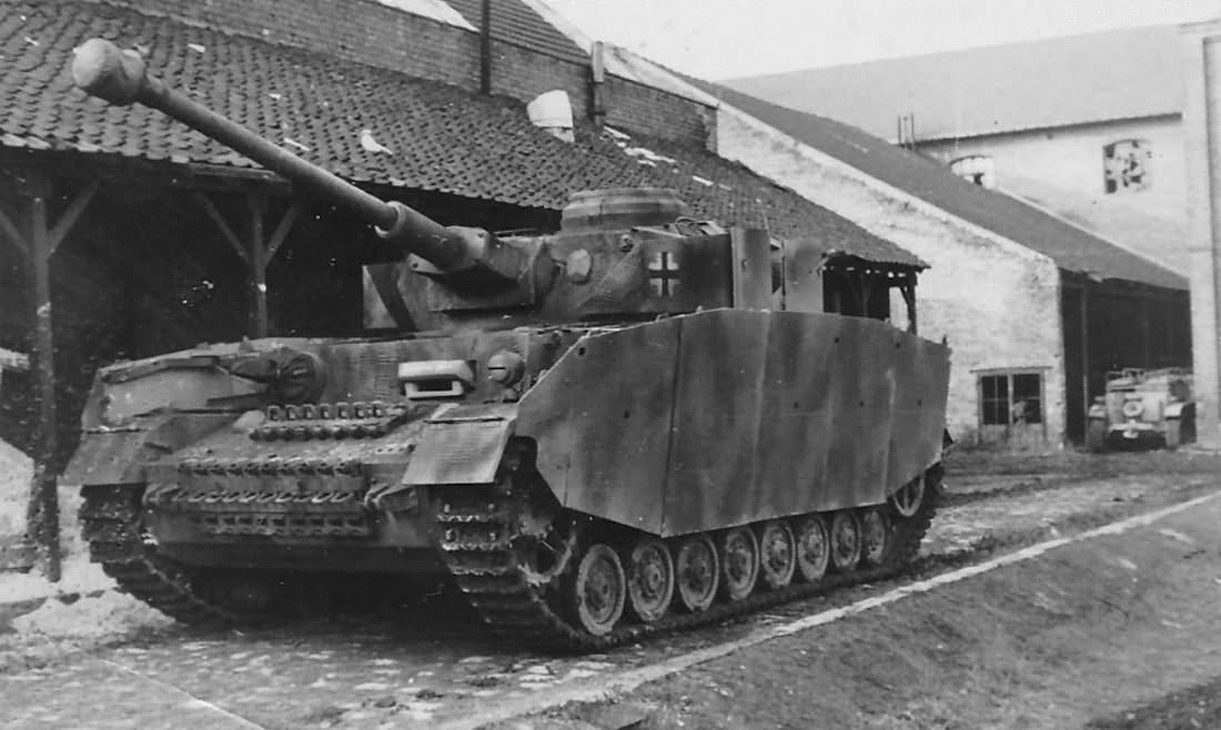
[Above: PzKpfw IV Ausf H of the 10th SS Panzer Division 'Frundsberg'.]
Bachmann's Knight's Cross recommendation document dated February 15, 1945.
'On the 17.01.1945 the I./SS-Panzer-Regiment 10 had the task of holding the bridgehead that had been created in the Offendorf area. The 3./SS-Pz.Rgt. 10 was subordinated to Kampfgruppe von Lüttichau and received the mission to eject the enemy forces that had entered into the southwestern part of Herrlisheim.
Radio contact had been broken off since 13:30 on this day. Thus, at 16:15, the Abteilung adjutant was sent to establish contact with the 3./SS-Pz.Rgt. 10 and confirm the situation with the Kompanie.
SS-Obersturmführer Bachmann reached the Kompanie and learned that the Kompanie commander had fallen out due to severe wounds.
Bachmann immediately took over command of the Kompanie and launched a surprise thrust into Herrlisheim with a Panzer-Zug. By skillfully employing his own 4 Panzers he was able to launch a very successful surprise attack against the group of enemy tanks in the village (consisting of some 20 tanks altogether). 8 tanks were destroyed in quick succession, and the crews of another 12 tanks gave themselves up without a fight. Their tanks thus fell into our hands in an undamaged and drivable state. One of the 8 destroyed tanks was personally set afire by SS-Obersturmführer Bachmann via a Panzerfaust.
20 German soldiers (including 2 officers) were freed from captivity in the process.
SS-Obersturmführer Bachmann thereby secured the village on his own initiative in a display of extraordinary bravery and decisiveness. The occupation of Herrlisheim laid the groundwork for the Division's continued operations.
SS-Obersturmführer Bachmann is a man of great character, and he is completely worthy of being awarded the Knight's Cross.'
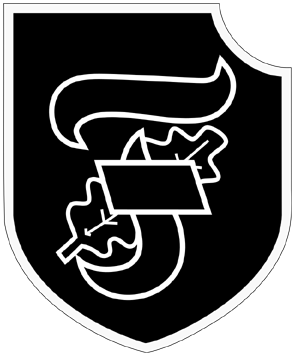
Back to Interviews








